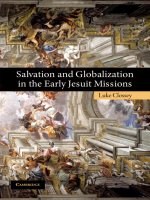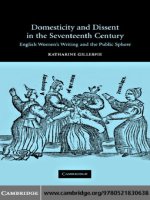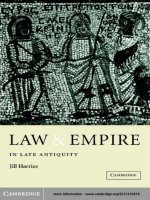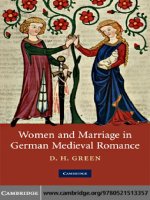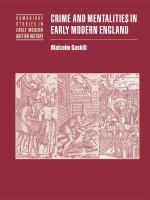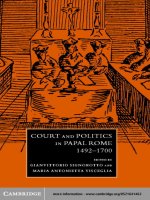0521862655 cambridge university press epic and empire in nineteenth century britain jul 2006
Bạn đang xem bản rút gọn của tài liệu. Xem và tải ngay bản đầy đủ của tài liệu tại đây (1.29 MB, 259 trang )
This page intentionally left blank
E P I C A N D EM P I R E I N
NINETEENTH-CENTURY BRITAIN
In the nineteenth century, epic poetry in the Homeric style was widely
seen as an ancient and anachronistic genre, yet Victorian authors worked
to re-create it for the modern world. Simon Dentith explores the
relationship between epic and the evolution of Britain’s national identity
in the nineteenth century up to the apparent demise of all notions of
heroic warfare in the catastrophe of the First World War. Paradoxically,
writers found equivalents of the societies which produced Homeric or
Northern epics not in Europe, but on the margins of empire and among
its subject peoples. Dentith considers the implication of the status of epic
for a range of nineteenth-century writers, including Walter Scott,
Matthew Arnold, Elizabeth Barrett Browning, William Morris and
Rudyard Kipling. He also considers the relationship between epic poetry
and the novel and discusses late nineteenth-century adventure novels,
concluding with a brief survey of epic in the twentieth century.
Simon Dentith is a Professor of English at the University of
Gloucestershire.
CAMBRIDGE STUDIES IN NINETEENTH-CENTURY
LITERATURE AND CULTURE
General Editor
Gillian Beer, University of Cambridge
Editorial Board
Isobel Armstrong, Birkbeck College, London
Kate Flint, Rutgers University
Catherine Gallagher, University of California, Berkeley
D. A. Miller, Columbia University
J. Hillis Miller, University of California, Irvine
Daniel Pick, Queen Mary, University of London
Mark Poovey, New York University
Sally Shuttleworth, University of Sheffield
Herbert Tucker, University of Virginia
Nineteenth-century British literature and culture have been rich fields for interdisciplinary studies. Since the turn of the twentieth century, scholars and critics
have tracked the intersections and tensions between Victorian literature and the
visual arts, politics, social organization, economic life, technical innovations, scientific
thought – in short, culture in its broadest sense. In recent years, theoretical
challenges and historiographical shifts have unsettled the assumptions of previous
scholarly synthesis and called into question the terms of older debates. Whereas
the tendency in much past literary critical interpretation was to use the metaphor
of culture as ‘background’, feminist, Foucauldian, and other analyses have
employed more dynamic models that raise questions of power and of circulation.
Such developments have reanimated the field.
This series aims to accommodate and promote the most interesting work being
undertaken on the frontiers of the field of nineteenth-century literary studies:
work which intersects fruitfully with other fields of study such as history, or
literary theory, or the history of science. Comparative as well as interdisciplinary
approaches are welcomed.
A complete list of titles published will be found at the end of the book.
EPIC AND EMPIRE IN
NINETEENTH-CENTURY
BRITAIN
SIMON DENTITH
University of Gloucestershire
Cambridge, New York, Melbourne, Madrid, Cape Town, Singapore, São Paulo
Cambridge University Press
The Edinburgh Building, Cambridge , UK
Published in the United States of America by Cambridge University Press, New York
www.cambridge.org
Information on this title: www.cambridge.org/9780521862653
© Mario Morroni 2006
This publication is in copyright. Subject to statutory exception and to the provision of
relevant collective licensing agreements, no reproduction of any part may take place
without the written permission of Cambridge University Press.
First published in print format 2006
-
-
---- eBook (EBL)
--- eBook (EBL)
-
-
---- hardback
--- hardback
Cambridge University Press has no responsibility for the persistence or accuracy of s
for external or third-party internet websites referred to in this publication, and does not
guarantee that any content on such websites is, or will remain, accurate or appropriate.
Contents
Acknowledgements
vii
Introduction
1 Homer, Ossian and Modernity
2 Walter Scott and Heroic Minstrelsy
3 Epic Translation and the National Ballad Metre
4 The Matter of Britain and the Search for a National Epic
5 ‘As Flat as Fleet Street’: Elizabeth Barrett Browning,
Matthew Arnold and George Eliot on Epic and Modernity
6 Mapping Epic and Novel
7 Epic and the Imperial Theme
8 Kipling, Bard of Empire
9 Epic and the Subject Peoples of Empire
10 Coda: Some Homeric Futures
1
16
26
48
64
84
105
127
150
175
196
Notes
Bibliography
Index
219
231
241
v
Acknowledgements
I wish to thank my colleagues at the University of Gloucestershire, who
enabled me to complete this book. Above all I thank my friend and
colleague Peter Widdowson, who has been endlessly encouraging and
supportive and who heroically undertook to read the whole typescript;
the book has immeasurably profited from his incomparable editorial eye,
in addition to all his other help. Bill Myers read very substantial portions
of the book at crucial stages in its writing; I am deeply grateful to him for
his helpful advice and encouragement. Roger Ebbatson also generously
undertook to read and advise on chapters of the book, and I thank him
for his kindness and encouragement.
I am also grateful to the many colleagues in different universities who
have heard and commented on sections of this book in earlier
manifestations: Geoff Ward and Marion Wynne-Davis at the University
of Dundee, Gavin Budge at the University of Central England, Pam
Morris, Glenda Norquay, Elspeth Graham and Tim Ashplant at
Liverpool John Moores University, Ian Baker and Robert Miles at
Sheffield Hallam University, Richard Pearson at University College
Worcester, Marion Thain at the Midlands Victorian Seminar, and Stan
Smith, John Lucas and Sharon Ouditt at Nottingham Trent University.
My thanks to all of them. For the love and support of my family during
the writing of this book thanks are inadequate, but thanks are all I have.
‘Epic’ by Patrick Kavaragh is reprinted from Collected Poems, edited by
Antoinette Quinn (Allen Lane, 2004), by kind permission of the Trustees
of the Estate of the late Katherine B. Kavanagh, through the Jonathan
Williams Literary Agency.
vii
Introduction
Is Achilles possible with powder and lead? Or the Iliad with the
printing press, not to mention the printing machine? Do not
the song and the saga and the muse necessarily come to an end with
the printer’s bar, hence do not the necessary conditions for epic
poetry vanish?1
Marx’s question, posed for himself in his notebooks in 1857, trenchantly
formulates a characteristic nineteenth-century idea, though this brief
quotation gives it an especially technological emphasis. What are the
historical conditions which underlie the production of epic poetry, and
do the wholly different social circumstances of modernity prevent the
writing of further poetry in the same heroic mode? Marx was not alone in
assuming the radical historical otherness of the social world from which
epic emerged; he was the heir, indeed, of a considerable intellectual
tradition, with its roots in the Enlightenment, for which the essential
antiquity of primary epics such as Homer’s was a central contention.2 In
this tradition, epic becomes the foremost evidence of the historical alterity
of the barbaric world; by the same token, it becomes a principal indicator
of our own modernity. The implications of this fundamental insight are
pursued in what follows.
This book addresses, then, one particular understanding of epic in the
nineteenth century, briefly summed up under the phrase ‘epic primitivism’. It pursues the consequences of this idea for the meaning of a
national poetry in Britain, for the translation of epic, for the possibility of
writing a national epic and for the conception of empire and its subject
peoples. A principal argument will be that ideas of modernity current in
the nineteenth century, though established in the eighteenth, are predicated upon an engagement with the sense of historical distance carried
by primary epics, especially those of Homer. This primitivist understanding of epic entailed consequences not only for poetry but also for the
1
2
Epic and Empire in Nineteenth-Century Britain
novel, and indeed more widely for ethnology and the relations between
the imperial centre and its colonised margins. The book will therefore
discuss a series of attempts to write epic poetry; styles of translation; the
difficult question of the relation of epic to the novel; and the close cousin
of epic, at least as understood in the light of epic primitivism, the national
ballad tradition.
This is certainly not the only study that might be written of epic in the
nineteenth century, which is a larger topic than might at first appear to
readers who are scratching their heads as they struggle to think beyond
Tennyson’s Idylls of the King, whose epic credentials are anyway doubtful,
or perhaps, in quite a different register, Barrett Browning’s Aurora Leigh.
A very different book needs to be written about Milton’s epic inheritance
for Romantic poetry and subsequently; readers will find no discussion
here of Wordsworth or Blake. Equally, there is no attempt here to provide a survey of all epics written in the nineteenth century, many of which
persisted in a broadly neoclassical idiom. Innumerable epics or shorter
poems written in the high heroic style were composed after 1800, often on
topics connected with Britain’s military or naval history; these will only
appear in what follows when they relate to its central themes.3 Many such
poems were once popular, but their appeal was effectively killed by the
social and military history of the twentieth century; they survived only in
dusty anthologies in school stock-cupboards into the 1950s and 1960s. It is
sufficient now to recall that ‘war poetry’ means for most people the ‘antiwar’ poetry of the First World War. That whole, earlier, tradition of
poetry, now effectively lost, needs neither revival nor further debunking; I
attempt neither, though the connection of epic to empire entails at least
some discussion of the anthology of heroic national poetry established in
the nineteenth century.
What the book does attempt is both a history and a map; indeed, this is an
area in which history and geography are inseparable: as we shall see, a map
of the world according to epic is at once a history of certain of its peoples.
It also attempts a conceptual map; I try to trace out a problematic, an
interrelated set of ideas bequeathed to the nineteenth century by the
eighteenth, whose consequences are worked out with varying differing
emphases by the writers discussed hereafter. These include Walter Scott,
whose importance in transforming ideas about epic and ballad can
scarcely be overestimated; Matthew Arnold and Thomas Carlyle, for both
of whom the question of epic was central to their thinking about national
history; the historian George Grote; the lesser-known writers William
Maginn and F. W. Newman, translators of Homer; Tennyson and William
Introduction
3
Morris, whose Sigurd the Volsung is the most sustained attempt at quasi
primary epic in the nineteenth century; George Eliot and Elizabeth Barrett
Browning, who both sought, in different ways, to transform the generic
inheritance of epic to contemporary and female ends; Rudyard Kipling,
who wrote a demotic and popular version of the epic of empire; and those
writers of imperial adventure stories at the end of the century, Rider
Haggard, Robert Louis Stevenson and Joseph Conrad, for whom epic was
the appropriate way of understanding the historical experience of the
subject peoples of the empire.
The theme which links these apparently diverse writers together is
a consciousness of the antiquity of epic as a genre. To use a phrase of
F. W. Newman’s, Homer is ‘essentially archaic’ – Newman coined the phrase
in 1856, contemporaneously with Marx’s notebook entry on the Iliad. It is
not merely that Homer is an old writer in relation to the moment in
history which we have now reached, but that he belongs to a phase of
human history which we have now definitively surpassed. The same could
be said of all the writers of primary epics that were either known about or
rediscovered in the eighteenth or nineteenth centuries. This consciousness
of the archaism of epic entails a concomitant consciousness of the modernity of the present era of human affairs; indeed, I assert that an engagement
with epic is at the heart of those theories of human progress which take hold
in the eighteenth century and continue, in however modified a way, into the
nineteenth. Why stop there? However discredited the notion of ‘progress’
may be, politically as the central notion of ‘progressive’ politics, or philosophically as the supreme example of a grand narrative which we must now
forgo, some such notion must remain in our accounts of human history:
the passage from hunter-gathering to globalised late capitalism may not
represent any moral progress, but it is certainly a narrative of a succession of
extraordinary social transformations, and the dynamics of this progression
require explanation. I emphasise this simply to underscore the fact that these
apparently faded debates about epic and modernity, which introduce the
book and which underlie the writing I discuss, should not be approached as
dead letters; there is no readily available contemporary perspective in the
light of which these old conundrums can be straightforwardly resolved.
Homer remains ‘essentially archaic’; we too are the heirs of those Enlightenment philosophers, historians and critics who established that; and the
nature of our engagement with his epic writings, and those of others,
remains a matter of emotionally and intellectually complex negotiation. I
do not write in the spirit of someone who, by virtue of his lucky posteriority,
has solved the problems that the book lays out.
4
Epic and Empire in Nineteenth-Century Britain
The study follows a broadly chronological path through the nineteenth
century; it starts with a brief account of eighteenth-century theories of
epic primitivism and their relationship to notions of modernity, and then
follows through the implications or entailments of those notions at various points in the intellectual and artistic history of the succeeding
hundred years. However, there is no sense here that this is a continuously
developing or unfolding narrative; on the contrary, what is traced are
various reworkings of a problematic, in different contexts and in relation
to differing problems, so that an interconnected set of ideas and aesthetic
challenges are worked through to sometimes congruent and sometimes
opposed or contradictory conclusions. The first half of the book is
broadly concerned with poetry: not just with epic poetry, but also with
the closely connected history of the ballad. In the second half I pursue the
same questions into the history of the novel; I take this to be the characteristic modern form for the nineteenth century, which seeks to
assimilate in various ways all the forms and modes of writing which
precede it. My discussion of the novel necessarily involves an account of
those twentieth-century critics for whom the relationship of epic to novel
is crucial: Georg Luka´cs, Mikhail Bakhtin and Franco Moretti. The
assimilative capacity of the novel – its power to absorb and subordinate
experience understood in epic terms – provides the central question
which I address to the novels discussed. Given the nature of epic primitivism, this means that the discussion of the novels will be framed by
the question of the representation of barbarous or heroic peoples, or more
precisely the appropriate mode or genre in which this representation
might be conducted. We begin, however, with the relationship of epic
and modernity as it was conceived by the Enlightenment thinkers of the
eighteenth century.
epic and modernity
How ought historicist criticism to be conceived? That is to say, what do
we take to be the characteristic procedures of an approach to literature
which seeks to understand it in its historical context – ‘context’ here
understood to mean not the mere simultaneity of historical events, but
the manners, geist or social system which that literature is both produced
by and illuminates? When did such procedures come to be adopted? The
answer to this last question is undoubtedly that the first extensive effort at
historicist criticism occurred in relation to the poetry of Homer in the
eighteenth century. But the answer to the previous question about the
Introduction
5
characteristic procedures of historicist criticism is not so straightforward.
It seems right to assume that historicising criticism should start with the
history and then proceed to the literature: to the extent that ‘history’ is
the larger category, it must necessarily precede, both logically and in
actuality, any literary product that is thought to emanate from it. But that
is not the case with eighteenth-century historical understanding of
Homer. On the contrary, the literature precedes the history, which is in
effect deduced from the literary text and then adduced to explain it. This
extraordinary interpretative circle must be the starting-point of any
account of epic and modernity.4
This productive circularity can be traced back to Vico at the beginning
of the eighteenth century, though it was the writers of the Scottish
Enlightenment who produced the most accessible and comprehensive
accounts of the progress of human society through various stages, in
which the reading of epic poetry provides some of the most persuasive
evidence. In fact, the history of Homeric criticism in the eighteenth
century has been carefully documented; this is how Kirsti Simonsuuri
summarises Vico’s account of Homer in the New Science:
This Homer was not an individual poet of genius, but could be found anywhere
if circumstances sufficiently similar to the Greek heroic age occurred. A people
that had created the heroic epic had by this fact also created its thought, its social
institutions, its leaders and its entire history. Homer’s poems were the myths of
their people and their ways of understanding and reacting to the world and the
age they lived in; and in a rigorous sense they were fully intelligible only to those
who had created and used them. The true Homer was a conglomerate of the
myths of the Greek people, an expression in language of their dreams and
actions: ‘Homer was an idea or a heroic character of Grecian men insofar as they
told their history in song’. And Vico’s more crucial discovery, implicit in this
idea of Homer, was that languages and linguistic forms are the key to the minds
of those who use words, and constitute the most profound evidence available of
the mental, social and cultural life of human societies.5
Vico’s New Science is not primarily an account of Homer; it seeks to
trace the history of human societies through their various stages. But
Homer is central to this argument, precisely because, as Simonsuuri
indicates, he can be read to reveal the self-understanding of heroic society.
Vico’s claim to scientificity, however, rests not on the historical taxonomy
that is implicit in the book, but on the philological method that sustains
this taxonomy. Our knowledge of the heroic world that Homer gives us
access to is dependent upon philological method. We can know the
6
Epic and Empire in Nineteenth-Century Britain
history thanks to appropriate attention to the text; in the light of the
history we can reinterpret the text.
The knowledge that is deduced in this way creates the sense of historical specificity, both of the heroic world and of contemporary civil
society. Take the case, for instance, of the characters of the Homeric
heroes Agamemnon and Achilles, about whom Vico writes thus: ‘This is
Homer, the incomparable creator of poetic archetypes, whose greatest
characters are completely unsuited to our present civilized and social
nature, but are perfectly suited to the heroic nature of punctilious nobles!’
(p. 357). This indeed is perhaps the central tenet in this mode of reading
Homer; it is precisely the ferocity of the Homeric heroes which leads
reader after reader in the eighteenth century to repudiate them as poetic
models in the neoclassical manner, and to read them instead as symptoms
of a previous regime of manners or stage of society. It is in this sense
that epic and modernity are interdependent notions from Vico onwards:
the sense of contemporary civility is produced out of a repudiation of the
heroism celebrated in epic, especially the Iliad.
This repudiation is not a straightforward matter, however; Vico again
anticipates a characteristic subsequent attitude in the ambivalence with
which he regards the ferocious heroism of the characters of primary epic:
‘The gruesome atrocity of Homeric battles and deaths is the source of the
astonishing power of the Iliad ’ (New Science, p. 371). This is not a theme
which Vico develops, but it will be developed at length later in the
eighteenth century. From the perspective of our modernity we can
repudiate the ‘gruesome atrocity’ of barbarous society, but respond also to
its sublimity or its power: we have lost as much as we have gained, or
rather, the price of our progress to civility is the loss of power and a world
made more pallid. Reading epic is henceforth going to be a complicated
matter; the reader will at once respond to its power, and at the same
time recognise the pastness of the world which produced such men,
such manners and such excitement. The progress to modernity is not
unequivocally a positive one.
Vico’s New Science provides, then – sometimes in unexpected or
undeveloped ways – some of the principal terms of the problematic that I
am seeking to set forth. It traces the progression of human society
through various stages, and in doing so adduces epic poetry as central
evidence of the heroic or barbarous stage which precedes contemporary
civility. Our knowledge of that heroic stage is produced out of an
engagement with epic, especially Homer; our sense of our own modernity
is conceived in the same act of engagement. This experience is ambivalent
Introduction
7
and does not typically produce a simple repudiation of the heroic past.
And finally, this whole historicising mode of reading can be viewed as an
interpretative circle in which knowledge of history and text derive from
and reinforce each other.
The New Science was published in 1744; twenty-five years later Adam
Ferguson published An Essay on the History of Civil Society, in which the
same tropes are rehearsed in a more systematic way. Ferguson carefully
distinguishes between the early stages of society: the ‘savage’ precedes
the ‘barbarian’, with the latter characterised by the presence of property
but the absence of the long-settled differences of a monarchy. All these
stages are radically different from contemporary civil society. Like Vico,
Ferguson was not writing a book about Homer, but, in effect, a conspectus of early human history; it is nevertheless striking how central
Homer also is to his arguments about the barbarous stage of mankind.
Indeed, many of his accounts of this stage of civilisation are in effect
deductions from the text of Homer. On this matter he is explicit:
It were absurd to quote the fable of the Iliad or the Odyssey, the legends of
Hercules, Theseus or Oedipus, as authorities in matters of fact relating to the
history of mankind; but they may, with great justice, be cited to ascertain what
were the conceptions and sentiments of the age in which they were composed, or
to characterise the genius of that people, with whose imagination they were
blended, and by whom they were fondly rehearsed and admired.6
Homer will be the principal witness of this kind, the behaviour of his
heroes being adduced as evidence of the mentality of the stage of civil
society from which they came.
This is especially evident when it comes to the matter of warfare;
Ferguson uses Homer to point out the differing conceptions of honour,
chivalry, respect for one’s enemies, and so on, which are evident in
Homer’s battle scenes. Thus in the following passage the method of
historicist deduction is clearly visible:
If the moral or popular traditions, and the taste of fabulous legends, which are
the production or entertainment of particular ages, are likewise sure indications
of their notions and characters, we may presume, that the foundation of what is
now held to be the law of war, and of nations, was laid in the manners of
Europe, together with the sentiments which are expressed in the tales of chivalry,
and of gallantry. Our system of war differs not more from that of the Greeks,
than the favourite characters of our early romance differed from those of the
Iliad, and of every ancient poem. The hero of the Greek fable, endued with
superior force, courage and address, takes every advantage of an enemy, to kill
8
Epic and Empire in Nineteenth-Century Britain
with safety to himself; and actuated by a desire of spoil, or by a principle of
revenge, is never stayed in his progress by interruptions of remorse or compassion. Homer, who, of all poets, knew best how to exhibit the emotions of a
vehement affection, seldom attempts to excite commiseration. Hector falls
unpitied, and his body is insulted by every Greek. (p. 200)
Our sense of distance from the manners of Homer’s time, then, is
traceable to the very different notions of chivalry and courtesy which have
supervened between then and now, and which can in turn be traced in the
romances of more modern epochs.
Ferguson provides, in short, a powerful Enlightenment account of the
stages through which mankind has passed in the transition from a savage
past to contemporary civility. Like Vico again, his account is by no means
unambivalent; he finds much to admire in the mentality of barbarous
peoples, and in his case his own Highland background lent some of these
passages a particular poignancy – though, as we shall see, the association
of epic with Highland society or its global equivalents will become much
more than a personal matter. We can take Ferguson as providing, in an
exemplary way, the general terms in which the transition from barbarity
to civility was to be thought in the late eighteenth and nineteenth centuries. Central to his account was a reading of Homer: a sense of modernity is in part produced out of a sense of the anachronistic pleasures to
be derived from a reading of the Iliad.
Ferguson was doubtless the most ‘philosophical’ of the ‘philosophical
historians’ of the Scottish Enlightenment; in his work the imbrication of
notions of modernity with a historicist reading of epic is especially clear.
In part cognate with these overarching progressive accounts of human
history, and in part independent of them, the eighteenth century also saw
the development of a bardic theory with relation to Homer which both
reinforces and complicates the general story told by the philosophical
historians. Historicism, insofar as it understands culture as expressing in
some sense the manners of the social world from which culture emerges,
appears to downplay the element of individual genius which produces any
cultural object; bardic theory, by contrast, emphasises the central
importance of the exalted artist. These potentially contradictory theories,
though they were certainly successfully combined, nevertheless provided
differing emphases for the understanding of epic origins both in the
eighteenth century and later.
Thomas Blackwell’s An Enquiry into the Life and Writings of Homer
(1735) provides one important source for the bardic theory of epic
Introduction
9
origins – and we can take it as the exemplary scholarly instance in the
eighteenth century, though of course there was a massive poetic interest
also in the figure of the bard.7 For Blackwell, Homer was simply a bard,
at once a ‘stroling [sic] indigent Bard’ and a member of a profession of
great ‘Dignity’.8 Bardic theory had at its heart an imaginary scene of
recitation. This is how Blackwell describes the ‘daily life of the AOI1OI’
(which Blackwell translates as ‘Bards’):
The Manner was, when a Bard came to a House, he was first welcomed by the
Master, and after he had been entertained according to the ancient Mode, that is,
after he had bathed, eaten, and drank some ME3IN1EA OINON, heartchearing wine, he was called upon to entertain the Family in his turn: He then
tuned his Lyre, and raised his Voice, and sung to the listening Crowd some
Adventures of the Gods, or some Performance of Man. (p. 116)
This is a scene which will be constantly reimagined for the next 150 years.
The extent of the dignity attached to such figures will be a matter of
intense debate throughout that period; the aptness or otherwise of the
implicit comparison between Homer and the myriad bard-like figures to
be found in the present or in recent history will also be a matter of
controversy. But the origins of epic in the recitation of some ancient bard
becomes a central element in notions of the genre as ‘essentially archaic’,
both in popular and scholarly conceptions.
The most important popular conduit for bardic ideas into the nineteenth century, as we shall see in the following chapters, will be Walter
Scott, whose Lay of the Last Minstrel (1805) is effectively a dramatisation
of the scene of recitation imagined by Blackwell. On a more scholarly
level, the Homeric controversy, which was conducted from the late
eighteenth century through to the late nineteenth century (and arguably
has never been resolved), took some of the elements of bardic theory and
sought to argue them through in technical philological terms. That is to
say, some scholars began to dissolve the Iliad and the Odyssey into preexisting ‘lays’ – of presumed bardic (and hence non-literate) origin – and
to use the methods of philological criticism to determine the activity of
some subsequent literate editor in transforming them into connected and
coherent narrative wholes. The most famous scholar in this vein was the
German F. A. Wolf, whose 1795 Prolegomena to Homer became the most
notorious item in the controversy. I discuss the Homeric (or sometimes
‘Wolfian’) controversy briefly in the next chapter; the point here is
that some proponents of Bardic theory (such as Walter Scott) could be
10
Epic and Empire in Nineteenth-Century Britain
strongly antipathetic to Wolfian views because they appeared to
downgrade the ‘original genius’ of Homer himself. The instability
introduced into historicist accounts of epic, and the now related forms of
romance, lay, and ballad, remains the same in both popular and scholarly
accounts: the original genius of the bard threatens to outweigh or
unbalance the original historicising impulse which consigns traditional
forms to their originating social moment.
‘Epic primitivism’ was thus a powerful if potentially unstable concatenation of ideas that came to be established in the late eighteenth
century. I shall refer to this nexus of notions – combined in differing
ways – as a ‘problematic’; that is, a connected set of ideas which can be
pushed to differing conclusions, but which provides the same epistemological horizon for disparate-seeming arguments. It took as its model
the poetry of Homer rather than his neoclassical imitators, and it sought
the origins of epic verse in the barbaric or ‘heroic’ stage of society. The
very sense of modernity or contemporary civility was constructed out of
the contrast with the manners to be deduced from the Homeric poems.
The appropriate comparison for early epic poetry was therefore not the
finished poetic products of the modern world but traditional and popular
poetry, traces of which were still to be found, especially in rude or
undeveloped regions. The originators of this early poetry, or bards, had
their historic equivalents in many societies, though their status was a
matter of controversy. But the scene of bardic recitation linked together
both theories of epic origins and ballad performance.
the entailments of epic primitivism
The problematic of epic primitivism entailed for the nineteenth century a
series of consequences not just for the understanding of epic poetry, but
for its translation and composition also; these consequences extended
equally to the writing of other forms of poetry, notably the ballad.
Subsequent chapters of this book will explore these entailments as they
work themselves through a range of nineteenth-century writing.
Epic primitivism suggested, in the first place, an equivalence between
the surviving traditional balladry of the contemporary world and the
ballad or popular sources of the epic in both the ancient world and other
barbarous or heroic societies. This suggestion was most strongly followed
through in both the poetry and the critical writings of Scott and his
successors; in Britain it had particularly important consequences for the
translation of Homer, for which it began to seem that some version of
Introduction
11
ballad metre might be more appropriate than the various kinds of
neoclassical or educated metres available after Pope or Cowper. Elsewhere
in Europe, this equivalence was to have explosive consequences in the
context of the various national revivals that convulsed the Continent in
the course of the nineteenth century; country after country discovered an
authentic national epic in the previously overlooked or slighted ballad
traditions in which their newly coined ‘national stories’ were told.
So, secondly, such traditional balladry became in effect the ‘national
song’ of the peoples to whom it was attributed. This is a relatively clear
process in the very differing national contexts of France, Germany, Spain,
Finland or even the United States: the Chanson de Roland, the Nibelungenlied, the ballad of the Cid, the Kalevala and, in imitation, Longfellow’s Hiawatha, were all advanced as expressions of the national spirit
of varying degrees of relevance to the contemporary world. But in the
British context the search for a traditional national epic was complicated
by the complexity of the national question in these islands, as we shall see
in a subsequent chapter on Tennyson and Morris. At all events, one
tradition of criticism in the nineteenth century advanced the ‘national
ballad metre’ as the authentic British prosody.
The belief in the essential antiquity of epic and its related traditional
forms meant, furthermore, that the exercise of writing an epic in the
modern world was always going to be a matter of pastiche. Since this is an
important notion for what follows, it is worth briefly dwelling on ‘pastiche’; it is here understood to mean the effort to imitate a manner or a
style without hostile intent. It is thus to be distinguished from parody,
which in most usages is presumed to have a mocking or polemical relationship to whatever is being imitated.9 Pastiche became inevitable
because the antiquity of epic, and other forms now understood as premodern, meant that the poet who wrote in these forms, or the translator
of them, sought to reproduce in the modern reader the kind of effect that
reading an essentially archaic poem would have: an experience which
itself entailed some sense of the presumed original experience of the first
listener. This is a problem that beset the writing of many kinds of poetry
from the late eighteenth century onwards, and it affected the translation
and composition of epic, ballads and romances, all of which became
classified as antique forms. The problem provoked a range of responses,
from forgery through imitation to the invention of antiquated-sounding
prosodic forms. This fundamental sense of the archaism of epic, and with
it other traditional forms of popular poetry, was the ultimate ground for
the range of forged or imitated poetic productions which were associated
12
Epic and Empire in Nineteenth-Century Britain
with the rediscovery of epic and ballad from the outset in the 1760s; the
same problematic continued to entail pastiche upon the poets of the
nineteenth century. Consider the following list: Macpherson’s Ossian
poems in the 1760s; Percy’s Reliques of Ancient English Poetry (1765) with
its range of imitated ballads; Chatterton’s ‘Rowley’ poems, also written in
the 1760s; Cowper’s toying with the idea of translating Homer into
Chaucerian English; Scott’s Minstrelsy of the Scottish Border (1802–3), with
its creative editorial practice and its forged and imitated ballads. Forgery;
imitation; pastiche: all were endemic to the problematic of epic primitivism, and all entail a complex negotiation between text and reader, in
which there is a simultaneous recognition of the supposed antiquity of the
verse form coupled with a knowledge of its actual contemporaneity (in
the case of forgery, this knowledge is restricted to the author). The many
nineteenth-century poems to be discussed in this volume had different
ways of staging this negotiation, with more or less reference to the
moment of actual composition, and more or less complete attempts at
direct imitations of antiquated diction and prosodic forms. Epic primitivism resulted in epic pastiche.
But a further result springs from the ambivalent attitude to the heroic
past that is built into the whole problematic – the sense that contemporary civility marks a real progression from the barbarous past, but
also that there is a real loss of glamour, heroism or straightforward poetic
interest in the decorous rationality of the present. A straightforward
repudiation of the barbaric stage of society which produced epic poetry
might result in a wholly rational poetry, but not a very exciting one; what
epic primitivism tends to suggest, on the contrary, is the problem of the
unsuitability of the modern world to poetry more generally. This will be a
matter of dispute throughout the nineteenth century, but the difficulty of
writing a modern epic when the form is strongly marked by its barbaric
origins is one which will beset many poets; in this study I discuss Aurora
Leigh, in which Barrett Browning vehemently repudiates the idea that the
modern world cannot sustain heroic treatment. The structure of feeling,
given its most powerful embodiment by Scott, by which the grandeur and
affective power of epic and its close cousin romance are relegated to the
past while modernity gets the prosperity without the affective glamour –
this structure of feeling will create particular problems throughout the
century for those who wish to find heroism in the contemporary world.
Carlyle, as we shall see, will solve this problem in an influential but
idiosyncratic way; William Morris will transform the whole problematic
by a dialectical inversion which makes the epic appeal of barbarism the
Introduction
13
basis for a critique of the insufficiency of the contemporary world. The
interdependence, which is to say the incompatibility, of modernity with
epic results in a sense of the essentially unheroic nature of the civil society
which has superseded the barbarous.
While the power and sublimity of epic, to use the categories suggested
by Vico, might have been lost in contemporary civil society, that does not
mean that they have been lost from the contemporary world altogether.
On the contrary, epic primitivism suggests, as one possibility, that
equivalents of the epic are to be found throughout the world in those
societies or among those peoples who are still at the barbarous stage of
their progress. But it also provides the seeds of a different account of epic
as the necessary form to be rediscovered for the atavistic business of
building an empire. In what follows, I will discuss these two contradictory
entailments. On the one hand, there is what might be thought of as the
traditional account of epic and empire: that there is a natural fit between
martial epic and imperial attitudes. This is a view shared both by proponents and critics of empire, as we shall see. On the other hand, epic
primitivism can be deployed to understand the subject peoples of empire;
this will be a widespread response in the nineteenth century, and its
political ambivalence will be explored.
epic and novel, and a generic map of the world
If epic as a mode is ‘essentially archaic’, then the mode most frequently
adduced as fitted for modernity is the novel. The relationship between the
two modes was a matter of scholarly controversy in the twentieth century,
as theorists of the novel sought either to claim an epic inheritance for
their form or to see it as repudiating its heroic forebear. While this debate
has its intrinsic interest, and will be duly considered in what follows, it is
introduced principally for the light it throws on two matters: how the
assimilative power of the novel makes it the form most fitted for the
modern world, and how the novel’s assimilation of epic leads to a generic
map of the world. In fact these two matters are inextricably related, since
modernity in a world of uneven development is as much a spatial or
geographical term as it is a temporal or historical one. That is to say,
while society in the nineteenth century had progressed beyond the heroic
or barbarous stage in most of Europe, on the European margins and
throughout the world beyond Europe, vestiges or living fossils of heroic
society persisted. The novel’s partial recognition of this, in imperial tales
at the end of the century, provides the topic for a concluding section of
14
Epic and Empire in Nineteenth-Century Britain
this book, where the trope of epic is pursued in novels by Stevenson,
Haggard and Conrad.
The notion of a generic map of the world – a map of the world
according to genre – needs some further explication. In a different,
though related, context, such a map was beautifully articulated by Jane
Austen in Northanger Abbey in 1818:
Charming as were all Mrs. Radcliffe’s works, and charming even as were the
works of all her imitators, it was not in them perhaps that human nature, at least
in the midland counties of England, was to be looked for. Of the Alps and
Pyrenees, with their pine forests and their vices, they might give a faithful
delineation; and Italy, Switzerland, and the South of France, might be as fruitful
in horrors as they were there represented. Catherine dared not doubt beyond her
own country, and even of that, if hard pressed, would have yielded the northern
and western extremities.10
‘Mrs. Radcliffe’s works’: Austen is here of course concerned with Gothic
fiction, which, although it is a characteristically modern form, is also one
which is coded as archaic – that is to say, it is a form which deals with the
horrors of a pre-modern world.11 It has its own geography, as Austen
suggests; Catherine’s mistake in the novel is to expect to find the terrors
which perhaps genuinely infest the Alps and the Pyrenees in the ‘midland
counties of England’. This is not just a generic map of Europe; it is also a
generic map of these islands, and their northern and western extremities
are the places where the Gothic might still be expected to lurk.
This book will argue a similar case in relation to epic as a genre. It is
possible, of course, to overstress the coincidence between the ‘northern’
and ‘western’ parts of Britain as visualised by Austen, and the North and
West of the Germanic and Celtic primary epics rediscovered in the
eighteenth and nineteenth centuries. The West is clearly the same West;
the gloomy Gothic possibilities of Wales, Ireland and Scotland are clearly
associated with the underdevelopment which characterised those regions
(or parts of those regions) in the nineteenth century; and one of the
central features in the many episodes of the Celtic revival from Ossian to
Yeats’s ‘Wanderings of Oisin’ 130 years later was a rediscovery of a
national epic. But this is a different North; for Austen the North means
surely the Highlands, while for Morris and the other discoverers of the
Nordic past the North meant the whole Germanic descent of a substantial section of the English population.
Nevertheless, the quotation from Austen is at least very suggestive –
that the genres coded as archaic thus have simultaneously a geographical
Introduction
15
centre of gravity as much as a historical one. A map of the world,
therefore, according to genre: in the nineteenth century, starting with the
islands of Britain and then including the whole planet, certain regions of
the world came to be strongly associated with certain genres coded as in
some sense archaic. These were epic above all, but also Gothic, as we have
seen, and romance as it is conceived in relation to epic. But these dispositions are reproduced within the novel; the way in which the latter
form assimilates the archaic material of epic, and thus provides an
implicit national geography, is the very matter of dispute between
Mikhail Bakhtin and Franco Moretti to be discussed below. Hence the
‘generic map of the world’: the book will seek to trace these dispositions
as they figure in the implicit or affective geography of the novel. As the
protagonist of Kidnapped or King Solomon’s Mines or An Outcast of the
Islands makes his way across borders – the Highland Line provides the
prototype for all these transitions – he makes his way into a world which
is at once ethnically and generically distinct. The imaginative map of the
world conveyed by the late nineteenth-century novel carries with it these
presuppositions of epic primitivism.
I begin, however, with an account of the Homeric question as it was
discussed in Britain, in conjunction with the Ossianic controversy, for in
both cases the imbrication of the understanding of epic as an antique
form with notions of modernity is evident. This leads on to a discussion
of the role of Walter Scott, whose importance as the principal transmitter
of this nexus of ideas into the nineteenth century cannot be overstated.


